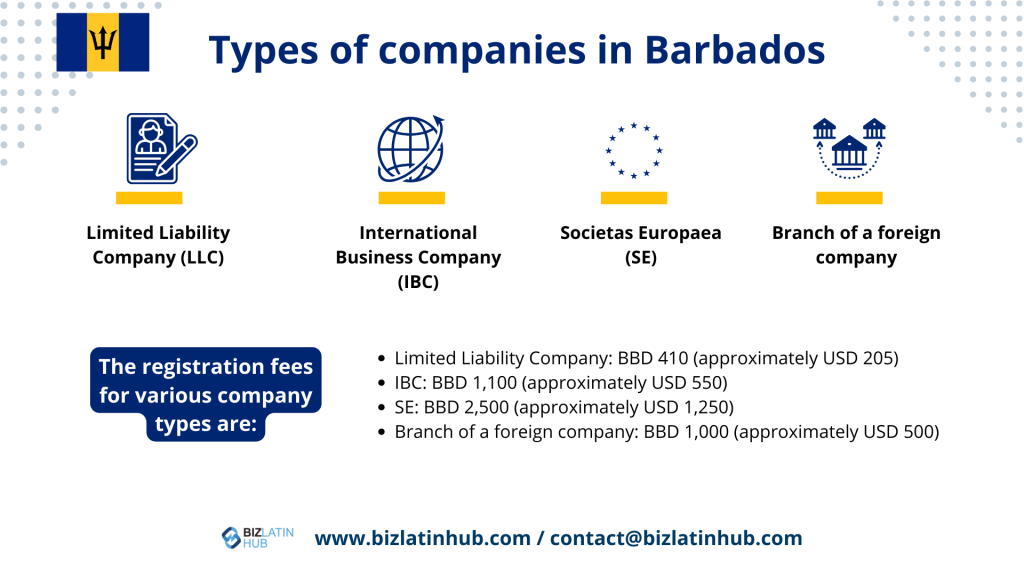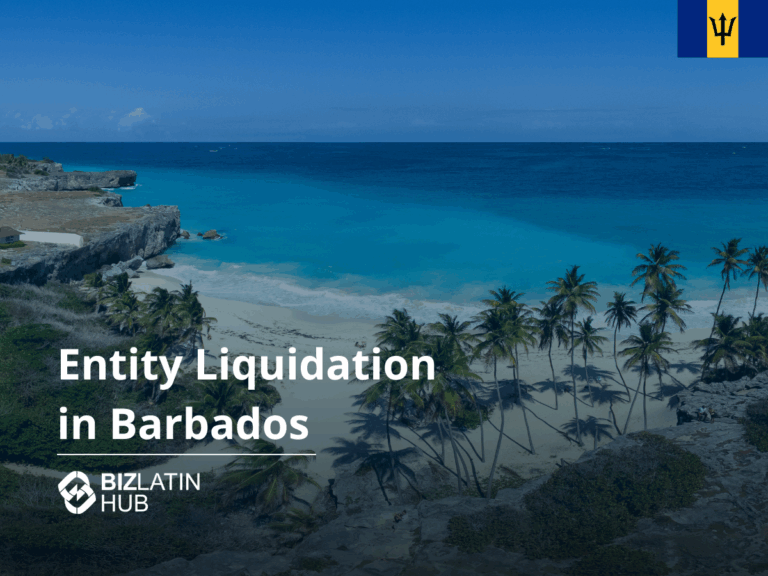Closing a company can be a difficult process for business owners. In Barbados, company liquidation follows a specific legal process. This process ensures the company’s final financial matters are handled correctly, just as in company formation in Barbados. It includes legal steps that affect shareholders and creditors and requires careful management. There are two types of liquidation: voluntary and involuntary. Specific regulations in Barbados control each type. These rules cover appointing liquidators, notifying creditors, and managing company assets. This guide details the seven essential steps for a voluntary liquidation of a solvent company, ensuring the process is handled in full compliance with the Barbados Companies Act.
Key Takeaways: Company Liquidation in Barbados
| What is a voluntary liquidation? | A voluntary liquidation is the process of winding up a solvent company that is initiated by the company’s own shareholders. It is not a bankruptcy proceeding. |
| What responsibilities do the directors have? | A declaration of solvency must be signed by the company’s directors. |
| What is the role of a liquidator in the dissolution process? | The appointed liquidator is responsible for selling the company’s assets, paying off all its creditors, and then distributing any remaining funds to the shareholders. |
| Are approvals necessary? | Shareholder approval is required to initiate the liquidation. |
| What are the final steps for dissolving a company with CAIPO? | Filing the final return with CAIPO. |
The 7-Step Process for Company Liquidation
Expert Tip: The Importance of the Declaration of Solvency
From our experience, the Declaration of Solvency is the most critical document in a voluntary liquidation process. This declaration, which must be signed by all or a majority of the directors, states that the company is able to pay all of its debts in full within a 12-month period. It is a serious legal statement.
If it is later found that the company was insolvent when the declaration was made, the directors can be held personally liable for the company’s debts. We advise all directors to conduct a thorough financial review to confirm the company’s solvency before signing this document.
Step 1: Make a Declaration of Solvency
The directors must formally declare that the company can pay all its debts.
Step 2: Hold a General Meeting of Shareholders
A special meeting of shareholders is held to pass a resolution to voluntarily liquidate the company.
Step 3: Appoint a Liquidator
At the same meeting, the shareholders appoint a liquidator to manage the winding-up process.
Step 4: File Documents with the Corporate Registry (CAIPO)
The declaration of solvency, the shareholder resolution, and the notice of the liquidator’s appointment must be filed with CAIPO.
Step 5: Settle Company Affairs and Distribute Assets
The liquidator takes control, settles all debts, and distributes the remaining assets to the shareholders.
Step 6: Hold a Final General Meeting
Once the affairs are settled, the liquidator calls a final shareholder meeting to present the final accounts of the liquidation.
Step 7: File the Final Return with CAIPO
Within one week of the final meeting, the liquidator files a final return with CAIPO. The company is officially dissolved three months later.
What is Company Liquidation in Barbados?
A company in Barbados can start liquidation in two ways: voluntarily or involuntarily. The Companies Act, Cap. 308, is the main law for both situations.
Voluntary Liquidation:
- Members decide to liquidate at a general meeting.
- A special resolution is passed to stop company operations.
Involuntary Liquidation:
- A court order starts the process.
- This often happens when a company has financial problems and cannot pay its debts.
The Liquidation Process:
- Start: A resolution or court order begins the liquidation.
- Notices: The list of directors is updated. Official notices are sent.
- Asset Sale: Company assets are sold to pay outstanding debts.
- Closure: Any leftover funds go to shareholders. The company then legally dissolves.
The liquidation process includes paying taxes and protecting creditor rights. The company must follow all legal duties in the Companies Act. Business owners should get professional advice to manage this process well.

Legal Basis for Liquidation
The Companies Act, Cap. 308, is the main law for company liquidation in Barbados. The law covers both voluntary and involuntary liquidation. Company members can start a voluntary liquidation. They make this choice at a general meeting. Involuntary liquidation occurs when a company cannot pay its debts. A court can then order the company to liquidate. The Bankruptcy and Insolvency Act, 2002, also guides the process. It offers options such as receivership, bankruptcy, and company reorganization.
Voluntary Liquidation
Company directors have a key function in a voluntary liquidation. They call a meeting to pass a resolution to close the company. This choice usually happens because of market problems or a new business strategy. After the resolution passes, a liquidator is appointed to manage the process.
The liquidator’s job is very important. This person gathers and sells the company’s assets to pay creditors. This action makes sure all financial duties are met. Voluntary liquidation is an orderly way to close a company. It gives the company control over the process. This path helps a company meet its duties to creditors. It also lets them give any remaining value to shareholders.
First Steps in the Liquidation Process
A company in Barbados starts liquidation voluntarily or involuntarily. Directors can choose voluntary liquidation. They pass a resolution if they think it is best for shareholders and creditors. This process requires appointing a liquidator. The liquidator manages the company’s assets and duties. In contrast, involuntary liquidation happens when others, like creditors or a court, take action. Creditors can ask the Barbados High Court to act if they are owed a certain amount of money. The main goal in either case is to get the most value from the company’s assets for everyone involved.
Appointing a Liquidator
Appointing a qualified liquidator is an important step. In Barbados, a liquidator should have a professional background in finance, accounting, or law. They must fully understand insolvency rules. Their work includes creating detailed reports on the company’s finances. They also describe every action taken during the liquidation. The law in Barbados says that secured creditors are usually paid before unsecured creditors. For this reason, liquidators need strong analytical skills to handle financial and legal issues. Their work can include risks like fraud, poor records, or fights between creditors. A careful approach is needed to solve these problems.
Notifying Stakeholders
The company must tell stakeholders about the decision to liquidate. This is true for both voluntary and involuntary liquidations. In a voluntary liquidation, directors hold a meeting to pass a resolution. This starts the notification to stakeholders. The liquidator leads communication with creditors. For an involuntary liquidation, creditors or a court start the process. Stakeholders usually receive a formal notice when the company is insolvent. The Registrar of Companies (at the Corporate Affairs and Intellectual Property Office – CAIPO) also helps notify the public. It publishes official notices in the Barbados Gazette. A company that does not follow the Companies Act can be removed from the Companies Register. This action tells stakeholders about the company’s status.
The Role of the Liquidator
The liquidator is the individual appointed by the shareholders to manage the dissolution process. Their primary duties are to take control of the company’s assets, settle all outstanding debts and liabilities, and distribute any remaining surplus to the shareholders according to their rights.
Liquidators have an important job. They make sure the liquidation process is smooth and follows the law. Their main duty is to check that all rules are met. Liquidators must write full reports on the company’s financial state. These reports also list the actions taken during the liquidation. They are accountable for reporting the company’s finances accurately to stakeholders.
A person must have a professional background in finance, accounting, or law to be a liquidator. They also need deep knowledge of insolvency rules. Liquidators face challenges like finding fraud, handling poor records, and settling creditor disputes. These tasks require careful work and good problem-solving skills.
Managing Assets
In a voluntary liquidation, directors appoint a liquidator to manage the process. The work includes collecting company assets and paying debts. The liquidator must gather all assets and pay creditors correctly. Any remaining assets go to the shareholders. External parties, like creditors or a court, usually start an involuntary liquidation. This happens when the company cannot meet its financial duties. In some situations, a receiver is appointed. The receiver manages certain assets to recover debts for creditors. The Bankruptcy and Insolvency Act, 2002, gives clear rules for managing assets during a receivership or insolvency.
Priority of Claims
In a liquidation, the priority of claims decides how assets are shared among stakeholders. This order is important for creditors. It affects their chances of getting their money back. The Companies Act and other laws set the claim hierarchy. This ensures creditors are prioritized fairly. Secured creditors usually have priority over unsecured creditors. This order affects who gets paid first during the asset distribution. The liquidator uses this hierarchy to share assets fairly among all creditors. This fairness is basic to the integrity of the liquidation process.
Understanding Legal and Financial Rules
The Companies Act, Cap. 308, guides the company liquidation process in Barbados. This law explains how to liquidate a company. Both voluntary and involuntary options are available. Voluntary liquidation is the company’s choice to stop operating. It usually starts with a special resolution. Involuntary liquidation happens when creditors use the law to intervene because of unpaid debts. This clear legal structure supports a stable business environment in Barbados. It protects both the company and its creditors.
Barbados’s Insolvency Laws
Barbados has insolvency laws to handle financial distress. These laws create order in business. The Office of the Supervisor of Insolvency oversees these processes. It ensures everyone follows the Bankruptcy and Insolvency Act, Chapter 303. A company facing insolvency can choose voluntary liquidation for an organized closing. Or, a creditor can file a petition in the High Court, which leads to involuntary liquidation. This legal structure offers clear options for businesses with financial problems.
Creditor Rights and Protections
Creditors have a key function in the liquidation process. They must file their claims quickly after liquidation starts. This action ensures their claims are handled according to the law. Strong governance protects creditor rights in all liquidations. During the process, creditors can prove the company is insolvent. This is important for getting repayments. Understanding creditor rights and duties is essential for a fair liquidation.
Compliance with Government Rules
Several laws and regulations control liquidation in Barbados. This ensures the process is lawful and transparent. Key governing bodies and laws include:
- The Companies Act: This is the main law for voluntary and involuntary liquidation.
- The Central Bank of Barbados: It regulates foreign exchange for liquidation activities.
- Sector-Specific Licensing: Companies in certain sectors like banking and insurance need government licenses for liquidation.
- Barbados National Standards Institution (BNSI) and Ministry of Health: Chemical manufacturing firms must follow their standards.
- The Fair Trading Commission: It ensures fair competition. This can be a factor if competition issues exist.
Necessary Documents
It is important to know which documents are needed for liquidation. The process usually requires documents like the articles of incorporation, the certificate of incorporation, and a notice of directors. These documents prove the company’s legal identity and authority. In Barbados, preparing correct and complete documents helps follow the legal framework of the Companies Act. Companies should keep clear records. They should have all legal documents ready for a smooth liquidation. Expert advice on Barbados business law helps ensure all documents are prepared and submitted correctly.
Reporting Duties
Reporting duties are a vital part of liquidation in Barbados. According to the Companies Act, a company must file a notice with the Registrar when it stops operating. This action officially cancels its registration. The Registrar publishes notices of a company’s suspension in the Gazette. This public notice informs stakeholders of the company’s status change. If a company stops its operations in Barbados, it must file a notice for cancellation. The Registrar will cancel the registration after receiving proof of cessation. This ensures the company meets its reporting and legal duties.
What Liquidation Means for Business Owners
Business owners in Barbados should understand voluntary and involuntary liquidation. It is important to know the duties of directors and the function of creditors during this process. Handling creditor claims correctly is essential to prevent legal problems. Business owners must respect creditor rights. They must also ensure creditors file claims quickly once liquidation begins. Ignoring these rights can create long legal fights. Owners should also know the legal and financial effects on company agreements and asset distribution when planning to close. Preparing for a possible involuntary liquidation is also very important.
Legal and Financial Effects
In Barbados, the Companies Act provides rules for liquidation. A company can start a voluntary liquidation if it cannot continue to operate. A court can order an involuntary liquidation if a company cannot pay its debts. Additionally, under the Bankruptcy and Insolvency Act, a bankrupt company can be liquidated. A receiving order places its assets with a trustee. This legal structure ensures the managed closure of a company. Business owners should be aware of these procedures to prevent surprise financial and legal effects.
Future Planning
Understanding the liquidation process is key for future planning. Business owners should be proactive. They should review risks from potential bankruptcy proceedings that creditors might start. Looking at these risks early allows for better planning. Business owners should also think about getting professional advice to handle the liquidation process. A proactive approach protects the company’s interests and ensures all legal requirements are met. Adapting to rule changes and keeping open communication with stakeholders are parts of successful planning.
Finalizing the Liquidation
Closing a company in Barbados requires several important steps. First, the company’s directors appoint a liquidator. This person manages the liquidation, collects assets, and pays creditors. In a voluntary liquidation, company members pass a resolution and choose a liquidator. The Companies Act, Cap. 308, and the Bankruptcy and Insolvency Act control these actions. They make sure the company meets all legal duties. In an involuntary liquidation, creditors can ask the Barbados High Court to start the process. Finishing the liquidation means sharing any remaining assets according to legal standards.
Sharing Remaining Assets
When a non-profit company in Barbados dissolves, sharing assets is a key issue. The articles of incorporation often say how to share remaining assets. The assets may go to members or other organizations. Problems happen if the articles do not give a plan. In this case, a special resolution must direct leftover property to charity programs in Barbados after all debts are paid. Legal rules support this. If the articles do not have distribution rules from the start, they cannot be changed later to benefit members. A good plan for sharing assets is important for legal compliance.
Official Closure Steps
In Barbados, the Companies Act gives the legal structure for closing a company. This can be a voluntary or involuntary liquidation. Voluntary liquidation begins when company members decide to stop operating. Involuntary liquidation happens when a company cannot pay its debts. This can lead to a High Court order for closure. The Companies Act, Cap. 308, provides the rules for closing a company’s affairs. This makes sure all actions meet regulatory requirements. The steps can include appointing a receiver to manage assets and pay debts. These actions complete the legal process of closing a company.
Frequently Asked Questions: Liquidating a Company in Barbados
A voluntary liquidation is the process of winding up a solvent company that is initiated by the company’s own shareholders. It is not a bankruptcy proceeding.
CAIPO is the Corporate Affairs and Intellectual Property Office, the government body in Barbados responsible for registering and dissolving companies. All liquidation documents must be filed with CAIPO.
The appointed liquidator is responsible for selling the company’s assets, paying off all its creditors, and then distributing any remaining funds to the shareholders.
The duration can vary depending on the complexity of the company’s affairs, but a straightforward voluntary liquidation of a solvent company can typically be completed within a few months to a year.
Biz Latin Hub can help you with company liquidation in Barbados
At Biz Latin Hub, our multilingual team of company formation specialists has extensive experience in supporting foreign executives when starting a business in Latin America. We offer a complete set of services for your business needs, such as legal, accounting, and recruitment support.
You can rely on us as your main contact for entering and doing business in any of the 18 markets in Latin America and the Caribbean where we operate.
Contact us now for personalized assistance or a free quote on company formation in Latin America.
Learn more about our team and expert authors.






